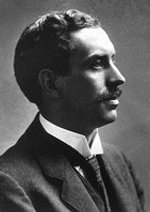|
 Charles Glover Barkla was a Nobel Prize winning physicist for his work in elucidating characteristics of X-rays. He was born in Widnes, Lancashire, England on June 7, 1877. His father, J.M. Barkla, worked in Lancashire for the Atlas Chemical Company. Barkla attended the Liverpool Institute and then University College, Liverpool. He attended the university in 1894 to study physics and math with Oliver Lodge. In 1898, he graduated with first class honors and a master’s degree in physics. Charles Glover Barkla was a Nobel Prize winning physicist for his work in elucidating characteristics of X-rays. He was born in Widnes, Lancashire, England on June 7, 1877. His father, J.M. Barkla, worked in Lancashire for the Atlas Chemical Company. Barkla attended the Liverpool Institute and then University College, Liverpool. He attended the university in 1894 to study physics and math with Oliver Lodge. In 1898, he graduated with first class honors and a master’s degree in physics.
In 1899, Barkla won a research scholarship from the Royal Commissioners for the Exhibition of 1851. He used it to attend Trinity College at Cambridge University. He worked with J.J. Thomson in the Cavendish Laboratory. In 1900, Barkla moved from Trinity to King’s College. He made the switch to be a part of the King’s College choir because of his love for singing. He returned to Liverpool in 1902 to be the Oliver Lodge Fellow, a position he held for three years. In 1905, he became a demonstrator at the university. Over the following four years, he advanced to the position of assistant lecturer in physics and then special lecturer of advanced electricity. In 1913, Barkla became the chair of natural philosophy at the University of Edinburgh and held that position until he died.
Barkla’s research began with the velocity of electric waves. But, in 1902, he began investigating the newly discovered X-rays. He found that X-rays can be polarized, which helped to prove that X-rays are the same as visible light. He also discovered that X-ray emissions consisted of two types. One of which, fluorescence, was a new discovery. Through his studies of X-rays, Barkla demonstrated important limitations of quantum mechanics. He was involved in an argument with William Henry Bragg, who believed X-rays were made of particles and used experimentation to attempt to prove him wrong.
Barkla won the Nobel Prize in Physics in 1917 for finding that different frequencies of X-ray radiation depends upon the atomic number of the element from which it came. Henry Moseley would probably have shared the prize had he not died in an untimely manner. Barkla was also honored by the Royal Society and the Hughes medal in 1916.
Barkla married Mary Esther Cowell in 1907. Her father was John T. Cowell, the Receiver-General of the Isle of Man. They had three children, one daughter and two sons. Their youngest, Lieutenant Michael Barkla, had a bright academic future ahead of him when he died in the war in 1943. Barkla died on October 23, 1944 at home in Braidwood, Edinburgh.
Image: Charles Glover Barkla.
|